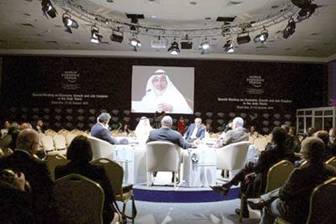 Experts Urge Arab Countries To Exploit Solar Energy PotentialOctober 24, 2011 - By Hana Namrouqa, Jordan Times DEAD SEA - Energy experts on Sunday predicted that solar power will be the most important source of energy in the Middle East within the next decade, calling on regional governments to shift from their reliance on oil to clean, renewable energy resources. Energy drives the economy and helps create job opportunities, the experts said, underscoring that the Arab world has a high potential for exploiting solar energy as it has the most sunny daylight hours of any region in the world. "Solar energy is efficient and abundant in the Arab world. Studies indicate that solar energy in the Middle East is twice the amount that could be collected in the US," Mohammad Barmawi, chairman of the Oman-based MB Holding Company, said yesterday.
He also called for creating a common electric grid among the North African countries to share energy between Egypt, Libya, Tunisia, Morocco and Algeria, in addition to investing in clean and renewable energy sources. Rabi Mohtar, Exec. Director of Qatar Environment and Energy Research Institute, noted that solar power is a clean and sustainable source of energy, underscoring the interrelatedness between energy and food and water security in the region. "The Arab world is not only sitting on a huge oil reserve, but also a huge reserve of solar energy," Mohtar, one of the panelists in the session, said yesterday. He called on the governments of the region to require energy companies under construction to carry out an analysis of water consumption in order to increase water efficiency and preserve limited water resources. "Energy companies should be aware of their water footprint during the process of energy production, while water cooling systems across the region should be replaced with high-tech air cooling systems," Mohtar highlighted. Kuwaiti Minister of Oil Mohammad Al Busairi said the Arab population's oil consumption is the fastest growing in the world, noting that each individual uses 11.4 barrels of oil yearly. "The 346 million Arab population of consumes 10.8 million barrels of oil daily constituting 5% of the worlds consumption of oil," Busairi said, underscoring that increases in oil production should be coupled with greater efforts to protect the environment from pollution. Although studies indicate that oil will remain the key source of energy in the Arab world until the year 2025, new sources of energy will start penetrating the market, the Kuwaiti minister said. Reliance on alternative energy resources in the Arab world will increase from the current 13% to 18% during the coming decade, Busairi predicted. Panelists discussed how reliable, clean and accessible energy can be provided across the Arab world, in addition to national energy strategies and regional cooperation, supply and pricing of energy reserves, and the role of clean energy in an oil-abundant region. |
Email this page to a friend
If you speak another language fluently and you liked this page, make
a contribution by translating
it! For additional translations check out FreeTranslation.com
(Voor vertaling van Engels tot Nederlands)
(For oversettelse fra Engelsk til Norsk)
(Для дополнительных
переводов проверяют
FreeTranslation.com )


 He made the remarks during a session titled "The
future of energy governance", held as part of the
He made the remarks during a session titled "The
future of energy governance", held as part of the